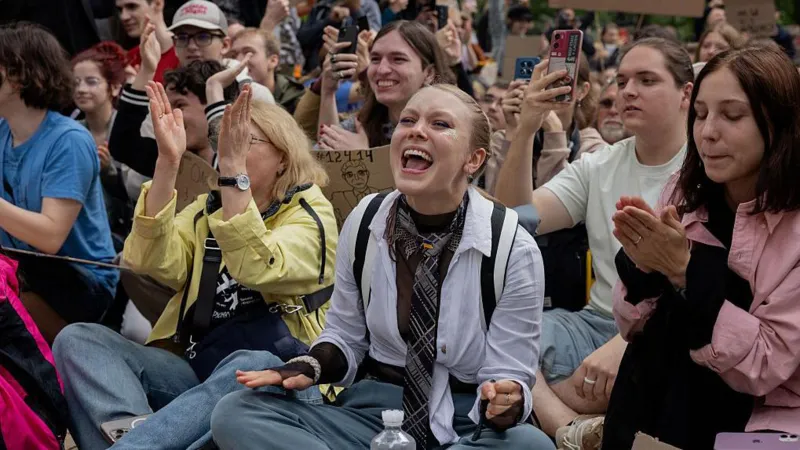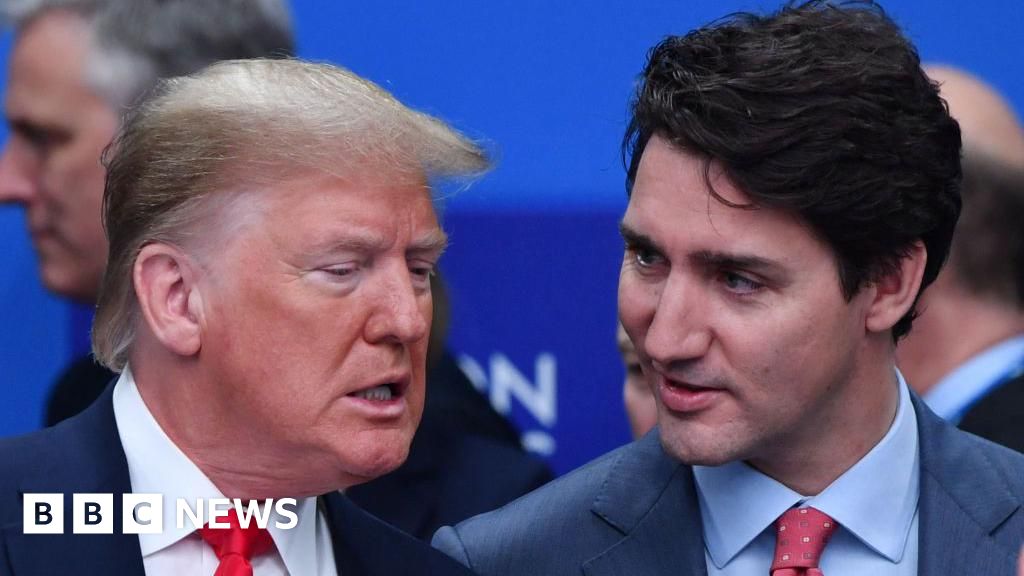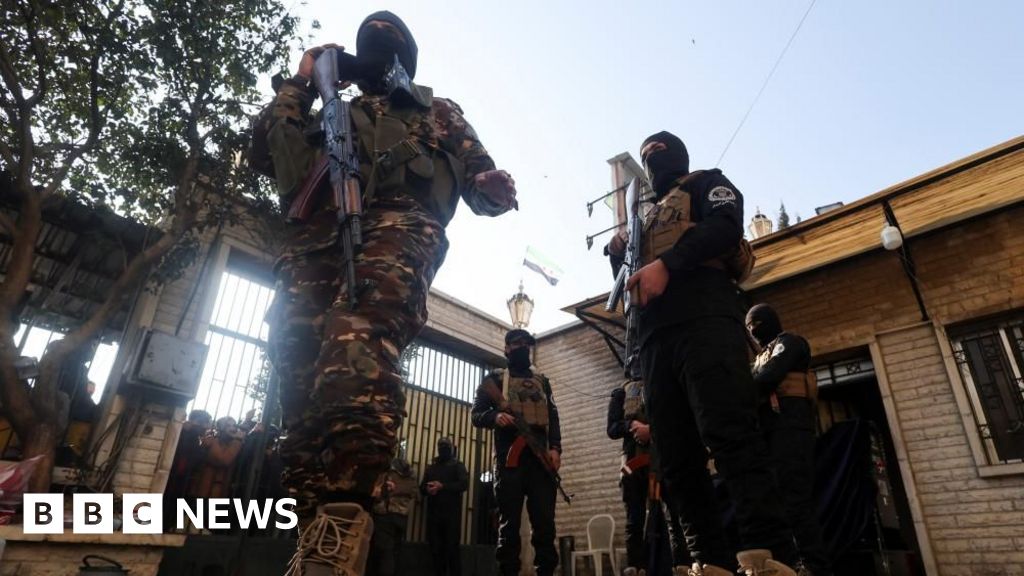BBC News Ukrainian in Kyiv
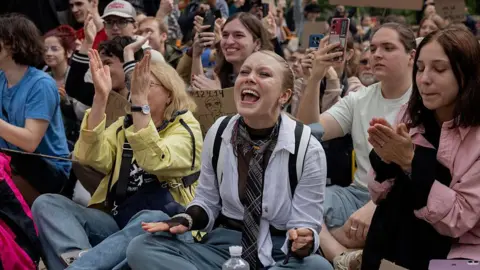 TETIANA DZHAFAROVA/AFP
TETIANA DZHAFAROVA/AFPAs Ukraine’s MPs gathered at parliament in Kyiv on Thursday, some held cardboard signs that read, “We are with our people.”
It was a message to thousands of young protesters who had taken part in the biggest anti-government demonstrations since the start of Russia’s full-scale invasion. They were out in force again on Thursday.
The MPs then entered parliament, the Rada, and took part in a vote that overwhelmingly overturned a law introduced by President Volodymyr Zelensky last week that curtailed the independence of two key anti-corruption agencies known as Nabu and Sap – the National Anti-Corruption Bureau and Specialised Anti-Corruption Prosecutor’s Office.
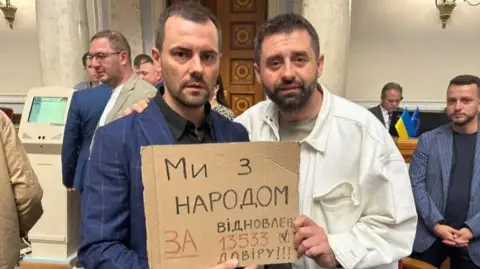
The signs carried by the MPs outside the Rada were a nod to the placards carried by thousands of young people who had taken to the streets in towns and cities across Ukraine for almost a week.
The protesters had demanded that Zelensky and his government “take their hands off” the two anti-corruption bodies, and they threatened to continue carry on until the government made a U-turn.
Within days, it did.
Zelensky’s original bill had stripped the two bodies of their independent authority to decide who to prosecute in high-level corruption cases, giving that prerogative to the general prosecutor – a presidential appointee.
For the placard-waving protesters, safeguarding the independence of Nabu and Sap was as crucial to their European future as the war against Russia was a matter of life and death for their country.
In 2022, Kyiv was granted the coveted status of EU candidate country – but on condition it mounted a credible fight against corruption.
For Ukraine’s Western partners, donors and investors who pour money into the country through international assistance and funding programmes, the existence and independence of the two anti-corruption bodies are non-negotiable.
And for Ukraine and its war-shattered economy – that external financial help is critical.
It was only 10 days earlier that MPs had backed Zelensky’s controversial law, and yet they voted on Thursday by 331 to 0 to overturn it. On both occasions they appeared to be following Zelensky’s direction.
“Ukraine is a democracy – there are definitely no doubts,” he said on social media.
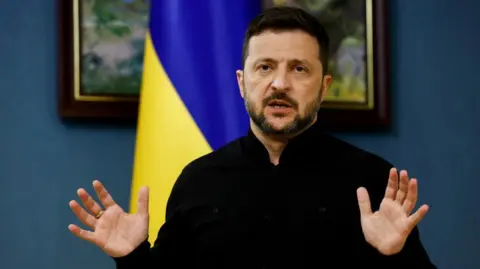 Reuters
ReutersMany Ukrainians see the hand of Zelensky’s right-hand man, Andriy Yermak, behind the president’s recent choices.
Yermak’s position as head of the presidential office is not regulated by the constitution nor limited by any checks or balances. And questions are being asked about such a role in Ukraine’s democracy.
Safeguarding that democracy and Ukraine’s course towards European integration were the key drivers for the young protesters, while their parents and friends were defending their country on the front lines.
MPs did their best to show the problem was now solved, but this crisis has left behind an unpleasant aftertaste.
It has brought into question Zelensky’s dedication to the anti-corruption reforms.
That he seemed ready to compromise on these reforms may have seriously dented the trust the EU put in him.
Some made the link between the government’s bid to curtail the independence of Nabu and Sap. Powerful figures in Zelensky’s circle have come under scrutiny, with some either facing charges or investigation.
Zelensky’s move also came after the government rejected a candidate selected by an independent commission to head the Bureau for Economic Security – the main agency for investigating economic crimes in Ukraine.
The official reason Oleksandr Tsyvinski didn’t get the job was that he didn’t get the security clearance from the security service, and that is under the president’s control.
However, Tsyvinski is a well-regarded anti-corruption expert and the selection commission still wants him appointed.
All these elements resulted in one of the biggest power crises for Zelensky’s team since he came to power in 2019.
Three and a half years into the full-scale war, the risk of further such mis-steps could come at a significant cost.
Next year, Ukraine’s budget deficit could hit $13bn (£10bn), according to a National Bank estimate. Kyiv would not be able to continue fighting the war if were to lose Western partners’ support.
Already, the EU has reduced some of its financial aid to Ukraine because the government has not kept up with promised reforms.
Ukraine’s young protesters appear to have understood that all too well, and were prepared to challenge their government in a country they chose to stay in despite the deadly threat of Russian drone and missile attacks.
